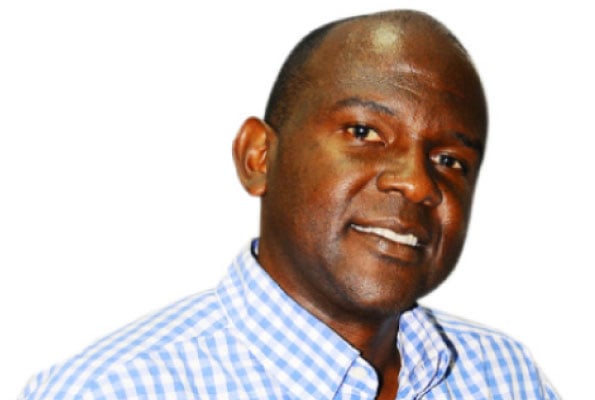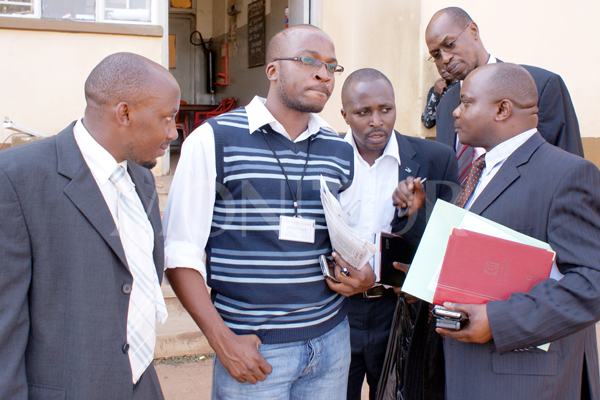Prime
‘They loved and hated Monitor so it lived’

Author: Nicholas Sengoba. PHOTO/FILE/COURTESY
What you need to know:
In short The Monitor found a firm base in an environment where people with conflicting interests could not make up their minds to hate it totally
The late 80s and early 90s that saw the birth of The Monitor were very intriguing times. The NRM government that had shot its way to power in 1986 and started with promise, was beginning to look and act funny.
The four-year mark ‘before handing over to civilian rule’, had been over stepped. The stories of corruption, horse trading, and human rights abuses were raising hairs in the most unexpected places.
Critical media was in the spotlight and rationally, it would be risky to venture into the area of the media as a business. The Monitor took a gamble that paid off very well. It positioned itself in the middle of the various conflicting sides - some extremely divergent. This way, many of those who The Monitor would potentially anger would not have common ground on which to stand and drive them into the sea.
One of the most sensitive areas of the time was the question of the restoration of traditional kingdoms, particularly the Buganda Kingdom dubbed ebyaffe.
The NRM needed the populous Buganda on its side as it prepared to ‘ban’ political parties and go beyond the promised four years. The Monitor founders had in Charles Onyango Obbo’s words a ‘republican streak’. This often angered many who saw The Monitor as ‘anti Buganda’ and some like Grace Ssemakula were wont to ask people to boycott the paper. Some like the late Jesse James Kirayankusa Namakajjo (an arch enemy of Wafula Oguttu) of the Third World Media claimed it was a UPC paper using the red masthead as ‘proof’.
So many in the party took a liking for. But Baganda would not unite with NRM that easily, to fight The Monitor because much as The Monitor ‘angered’ them with stories about the kingdom, it also gave them hope as an ally.
Since it was a very critical voice against the government that was dragging its feet on the issue. The government still held onto various properties that were stolen from the kingdom in 1966 after Milton Obote banned it. There was also concern that government was planning to deliver a watered down version of the monarchy (byooya bya nswa.) So it wasn’t prudent to be hostile to such a fearless voice. With the wisdom of hind sight it has paid off.
Then there was the controversial issue of political party activity in Uganda. The NRM government undertook a self preserving campaign to popularise the notion that political parties were the cause of Uganda’s problems and so the need for ‘no party democracy’.
The Monitor had the likes of Wafula Oguttu, the founding Managing Director, who were NRM leaning (despite the UPC allegations!). In fact some of Oguttu’s friends from NRM had a helping hand in starting the paper in terms of logistics. Oguttu would at times make subtle calls for giving the NRM time to ‘put things in order,’ then return to civilian rule. Other people argued that such leg room was intended to obliterate the parties while strengthening NRM. It came to pass.
In so doing the paper had itself in the good books of many in the NRM and ironically in bad books of ‘multipartyists’. But because it also stood out as the ‘anti government’ paper when compared to other papers; the vilified ‘old political parties’ (UPC and DP) and other pluralists, their alliance with the paper was formed and treasures as their voice against the ‘bullying’ NRM.
Even the NRM as a government that was the ‘victim’ of The Monitor had an interest in keeping it alive despite its many ‘bad manners’. With the banning of political party activities, the critical Monitor was very often proudly cited as ‘proof’ that you did not need political parties to have a vibrant democracy. This is despite the fact that the paper was often raided, closed and editors sued when the government felt that the handshake had gone beyond the elbow. With a paper like The Monitor you had an opportunity in the ‘independent’ media to have your contrary voice heard.
Again within the NRM the contradictions mentioned earlier that had started becoming visible, thick and fast, needed a voice like The Monitor to expose their opponents and preempt any harm coming their way.
Then the fact that The Monitor always stood with the underdog even those who hitherto fought hard to have them closed down endeared many to this voice. I recall the vocal lady minister who called for The Monitor to be closed down for showing the picture of a woman being shaved by a soldier. She later became very vocal in opposition circles after being dropped for opposing the lifting of term limits. Also the senior military officer who threatened to close The Monitor for a bad story about an intelligence agency he headed but was later ‘adopted’ by The Monitor when he was locked up in the officers mess for voicing political views in the wrong forum. These realities taught many about the need for a paper such a paper even when you did not agree with its line for you never knew when it would come to play in your corner.
Not that all the people who leaked information about dirty dealings in government were patriots. Many were like actors in movies, were thieves who had fallen out for want of proper sharing. These turned a blind eye to the ‘bad things’ The Monitor said about ‘their,’ government and prayed that it survived as their outlet for grievances about the inconsistency in their party.
So the very corrupt found solace in The Monitor to help them fight ‘dishonorable thieves’. In so doing they found themselves at the right hand of those who genuinely leaked information to expose corruption.
Then there was the naughty, salacious side to reporting which The Monitor introduced. The ‘gender issues’ page annoyed as many as it entertained. I recall a critical piece of the paper when it was celebrating its first anniversary, titled ‘Another one bites the dust’, by none other than Timothy Kalyegira.
Kalyegira condemned the paper for highlighting ‘vulgar matters’, concealed as gender issues. Many liked the almost sexually explicit writings of a one Jenny and Monitor Gossip but in public condemned it for promoting immorality that would lead to the spread of HIV/Aids. So you found people buying to read, enjoy and offer their criticism. On a serious note it gradually gave a voice to many issues that are now topical and popularly reported about in mainstream media, such as gender based violence, despite the unserious inception.
In short The Monitor found a firm base in an environment where people with conflicting interests could not make up their minds to hate it totally.
Mr Sengoba is a commentator on political and social issues
Twitter: @nsengoba




